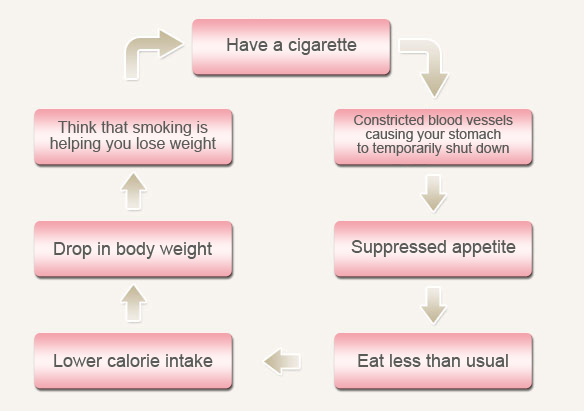Have you heard that smoking makes you lose weight? Conversely, it is rumored that quitting smoking can cause you to get fat. For these reasons you may be reluctant to quit. Let's see if the rumors are what they are made out to be and see how smoking and your diet mix together.
Smoking not only makes you thin, but also leaves you frail
When you smoke or inhale cigarette smoke, nicotine enters you body. That nicotine has an effect of suppressing your appetite. With an inhibited appetite, the amount of food you eat decreases. You may be thinking that this combined with exercise could set your body up to loose weight. Before going on a smoking-diet, read what consequences instore.
Smoking as a catalyst to keep your weight down is an attractive thought at first. Not only are you able to continue your long time habit and pastime (getting the fix when you need it) it's easy to keep your weight down to a manageable level. However, the real reason behind your loss of appetite is that when you smoke your blood vessels constrict (narrow) not allowing sufficient blood to flow to your stomach causing it cease functioning. This is why smoking is said to increase the rate of heart attacks. Smoking constricts your blood vessels, which increases the risk of your arteries clogging, causing you to have a heart attack. Knowing this, you wouldn't exactly want to call this a good way to suppress your appetite. Although it might be the case that you are able to drop your weight using this method, but what is really happening is that your body is being worn out, not just getting thin. That is why smoking and dieting don't mix and should be avoided for your better health.
How smoking causes you to lose weight
The following shows how smoking can cause you to lose weight, the smoking – weight loss cycle.

The smoking – weight loss cycle begins by having a cigarette, which in turn constricts your blood vessels causing your stomach to shut down temporarily. As a result of your stomach not functioning the way it would normally, your appetite is impaired causing you to eat less (lower calorie intake). This creates a negative energy balance in your body, which results in you losing weight. After losing weight, you have less to worry about so you have another cigarette. Here we go again, down the same old path, like a maze full of smoke.
The reason behind why quitting smoking cause you to gain weight
The reason why people who have been smoking for a long time gain weight after quitting is that without nicotine entering your body, there nothing to suppress your appetite. Now that your stomach is back up and functioning the way it should again, you are likely to eat more than you did while smoking. In addition, the smell that smoking leaves in your mouth is no longer there. This improves your sense of taste, making you food more delicious. With a newfound sense of taste it isn't hard to understand why this would cause you to overeat. Just like breaking any habit is stressful, the urge of smoking (craving) after quitting can give you an appetite. These are the obstacles standing in the way of both trying to quit and keeping your weight off.
How to not gain weight after quitting smoking
| Reason you gain weight | How to deal with it | |
|---|---|---|
| Normal stomach functionality, due to the fact that nicotine isn't suppressing your appetite anymore. Imagine waking up one day eating more than ever, that is what it should feel like. | Lengthen the time you spend eating by chewing your food more than usual, taking smaller bites, cutting your food properly before putting it in your mouth. Make detailed record of the food you eat, getting a grasp of your calorie intake. | |
| Improved (newfound) sense of taste allowing you to enjoy your food more causing you to overeat, due to the absence of the smell left in your mouth after smoking. Picture every meal delicious as if prepared specially by a high class chef. | ||
| Increased appetite, due to the stress of quitting smoking and cravings. Throwing down a back of potato chips when you had a tough day (is okay.. sometimes) but while trying to quit, its going to happen more often than you think. | Find something that serves as an alternative to smoking, such as a low-calorie snack or a piece of gum. |
Comparing yourself to when you smoked, your stomach works and you food tastes better (increasing your appetite) making it hard to not to see your weight jump off the scale. At the very least, you've reverted back, in terms of your health. All that's left is to exercise; increasing the amount of calories you burn off. The next thing you know, you'll be eating more than you did while smoking and manage not to gain weight.
Just because smoking may be able to help you lose weight, doesn't mean that it is right for your diet. While you smoke, you become more and more dependent on nicotine, making quitting hard to say the least.
In the case that after quitting you find that you want to return your appetite to the way it was (by starting up again) when you smoked because you fee that overeating is making you fat; the end result could lead to you becoming even fatter than before. This sort of behavior will only leave you wondering what came first (the chicken or the egg) smoking or getting fat.
As the price of tobacco goes up every year, you might want to use this as an opportunity to put more money in your pocket. If you are worried that quitting is going to make you fat, then refer to the table above, and you too can go without smoking without having your weight blow up.








